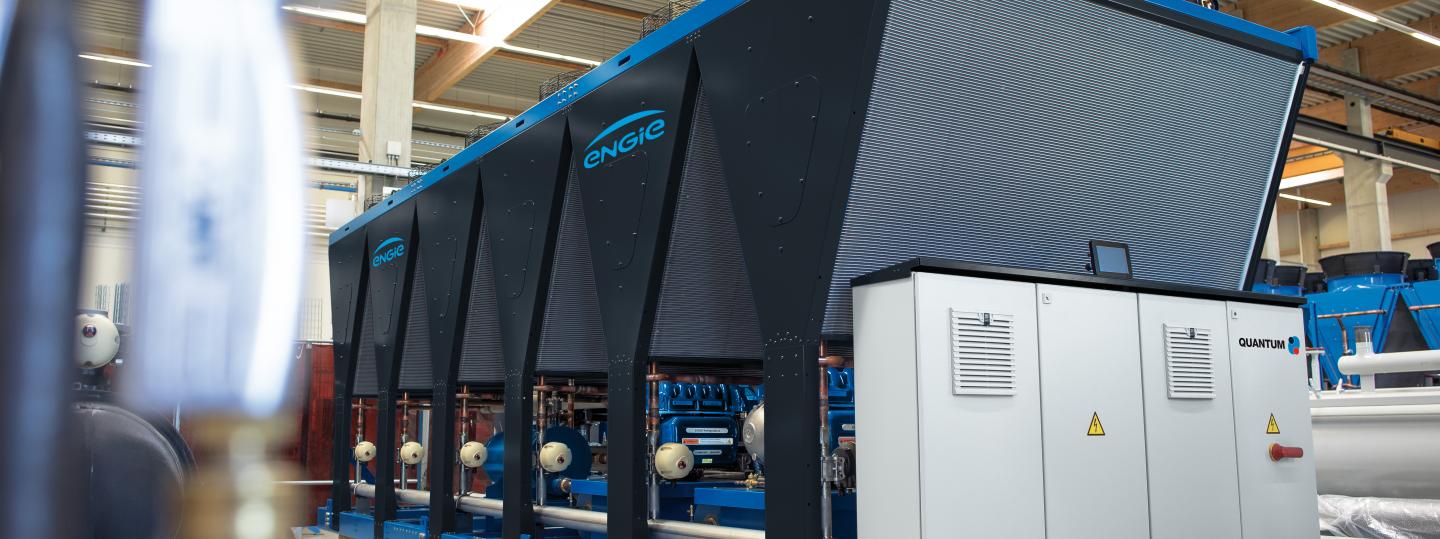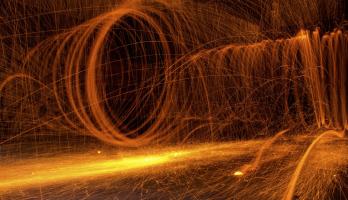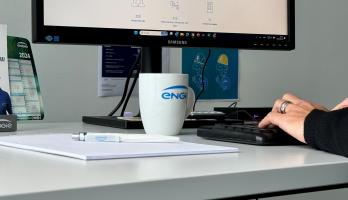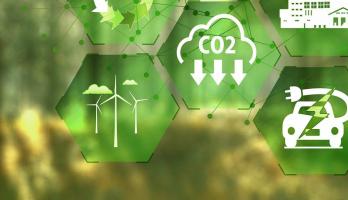
QUANTUM Air 4.0 chillers: a new definition of energy efficiency and sustainability
Energy efficiency is incredibly important when it comes to improving climate protection, especially in the energy-intensive industry of refrigeration and climate control technology. ENGIE is making a considerable contribution towards greater sustainability with its new QUANTUM Air generation 4.0 chillers, and has taken a pioneering role in the refrigeration industry with its highly efficient chillers.
Sustainable climate protection is considered a key political issue in the European Union and is becoming increasingly important against the background of social debates. Accordingly, the EU has defined ambitious climate targets that have to be implemented as part of the Ecodesign Directive, for example. By 2030, greenhouse gas emissions should be at least 40 per cent lower than in 1990. Measures to increase energy efficiency play an important role in reducing carbon emissions. Innovations in the energy-intensive field of refrigeration and climate control technology in particular can make a significant contribution here. With its QUANTUM Air 4.0 chillers, ENGIE is assuming a pioneering role in the refrigeration industry and setting new standards in terms of energy efficiency and sustainability.
How does the Ecodesign Directive affect the use of chillers?
It will be easier to achieve the targets specified by the European Union if less energy is consumed and, correspondingly, generated. That is why the EU has defined clear requirements for the eco-friendly design of product groups that are relevant in terms of energy consumption – such as pumps, electric motors, household fridges and refrigeration systems – in its Ecodesign Directive 2009/125/EG, which took effect in 2018.
Chillers are subject to Regulation (EU) 2016/2281 for process cooling at high operating temperatures and climate control, and to Regulation (EU) 2015/1095 for process cooling at medium and low operating temperatures. These EU regulations define the legal limits for the minimum efficiency of chillers that are used in process cooling and climate control. Importantly, refrigeration systems that do not comply with the energy efficiency standards specified in the Ecodesign Directive may no longer be sold on the European market.
Performance indicators: SEER and SEPR provide information on the energy efficiency of chillers
The energy efficiency of chillers is specified using the performance indicators SEER (seasonal energy efficiency ratio) and SPER (seasonal energy performance ratio). They describe the energy efficiency of refrigeration systems on the basis of a one-year usage cycle with consideration of periods under partial or full loads. The EU has defined minimum SEER and SEPR values for the period from 2018 (Tier 1) and the period from 2021 (Tier 2). New refrigeration systems must comply with these minimum values before they can be sold on the European market.
QUANTUM Air 4.0 from ENGIE sets new standards in terms of energy efficiency and performance
With its new air-cooled chillers from the QUANTUM Air 4.0 series, ENGIE is launching the most cutting-edge generation of highly efficient, powerful and sustainable refrigeration solutions which meet even the future requirements of the EU with great ease. Such a refrigeration system can provide huge savings, even in terms of the Tier 2 value that will apply only after 2021; a good example is the air-cooled QUANTUM A1250 with a refrigeration capacity of 1,200 kW, which is used year-round in areas such as server cooling. Even during this type of usage cycle, the chiller consumes 410,000 kWh less power than specified by the future EU reference value. Under the line, this yields annual power savings of around 78,000 euros per year for the operating company as well as a reduction in carbon emissions of roughly 200 tons (at around 19 cents/kWh and 0.475 kg CO2/kWh).
QUANTUM Air: sustainability in focus
To understand how the increased energy efficiency of such a chiller affects sustainability, it is worth drawing a comparison with nature. A beech tree that grows for 80 years will absorb around one ton of CO2 during this period, for example. Reducing carbon emissions by 200 tons through the use of a QUANTUM Air from the example above corresponds to the annual absorption capacity of around 16,000 beech trees. From an ecological perspective, it is thus essential to ensure that chillers operate with energy efficiency, and to attach great importance to energy efficiency and sustainability even during the procurement phase.
Companies that choose the new QUANTUM Air chillers benefit not only from considerably lower greenhouse gas emissions due to the highest levels of energy efficiency, but from other advantages as well. These include:
- Efficient use of operating materials (refrigerant)
- Efficient operation due to intelligent connections in the turbo compressor configuration, flooded evaporation, the economizer and the micro-channel condenser
- Oil-free operation guaranteed by turbo compressors on magnetic bearings
- Compact and light modular design
- Fast delivery times and good serviceability
- High level of operational safety and long service life
- Low emissions of air and structure-borne sound
- Suitable for numerous industries, e.g. data centres, hospitals, industrial buildings or office buildings
The QUANTUM Air 4.0 brings these benefits to the environment and your wallet
- 200 tons less CO2 emissions per year
- 78,000 euros less electricity costs per year
Facts & figures
- 28 models
- 3 refrigerants: R-1234ze, R-134a or R-513A
- –20% refrigerant charge [kg]
- –20% operating weight [kg]
- –10% footprint [m²]
- –10% CO2 footprint (TEWI value* [kg CO2])
*The TEWI value is a reference value for assessing the impact of an overall system on the greenhouse climate (CO2 footprint). The TEWI value takes into account both direct and indirect CO2 emissions from the chiller during operation.
The data are mean values for the entire model series.









